Behind bars: how a historian and activist became Ingushetia’s most famous woman
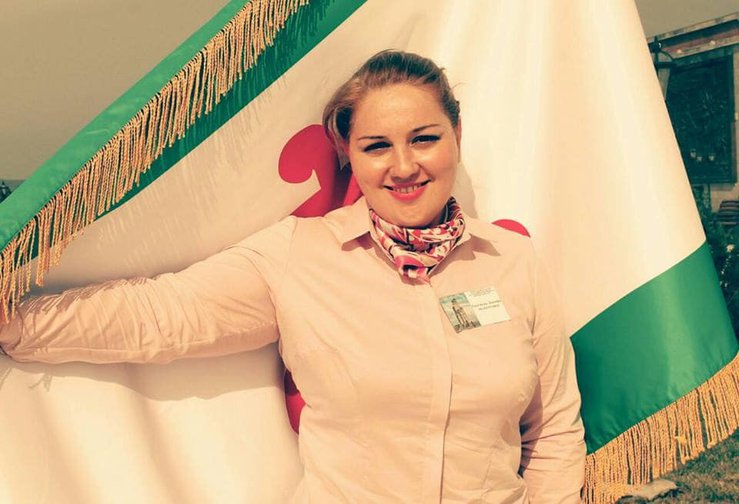 Zarifa Sautiyeva | Source: Personal archive
Zarifa Sautiyeva | Source: Personal archive 25 June 2020
25 June 2020
In autumn 2018, on the border between Ingushetia and Chechnya in Russia’s North Caucasus, border posts began to move mysteriously. Soon after, it was discovered that a boundary agreement had been struck between the two republics, led by Yunus Bek-Evkurov on the side, and Ramzan Kadyrov on the other.
Angered at the transfer of 10% of a border region, a popular movement emerged in Ingushetia to protest this decision. Zarifa Sautiyeva, ex-deputy director of the Museum of Victims of Political Repression in Ingushetia, found herself in the middle of it alongside journalist Izabella Evloyeva - streaming the events live on Facebook.
Zarifa was later arrested as part of a crackdown on the movement, with 26 people charged with violence against the police. She is the only woman arrested for her part in the disruption caused by the issue and has been in a pre-trial detention centre since June 2019.
Zarifa’s friend, journalist Isabella Yevloyeva, who also took part in the protests and has had to leave the country, tells her story up to her arrest and recollects the events that have changed the lives of both women.
4 October 2018. “Scum! Scum! We won’t leave!” I hear my own voice. “Scummmm!” Zarifa shouts after me as a series of rifle rounds are fired into the air. Someone in the crowd had thrown a bottle at Yunus-Bek Yevkurov, head of Ingushetia, after a scuffle broke out and his guards fired in the air.
There are tens of thousands of protesters on the main square in Magas, the capital of Ingushetia in Russia’s North Caucasus. Zarifa Sautieva and I are standing at a bus shelter a hundred metres away from the shooting: it’s the only place around with Wi-Fi – the authorities have shut down mobile internet everywhere else. We’re streaming the incident on Facebook, to record what’s going on in our home republic after Evkurov signed an agreement to hand 10% of a border region over to neighbouring Chechnya.
Eighteen months later, the whole world is in forced isolation because of the Coronavirus epidemic, but Zarifa has been isolated for much longer. She is in a pre-trial detention centre in the city of Nalchik, alongside other activists. Fate has unexpectedly thrown us apart: many are behind bars; some are still at liberty and a few have left the country and can’t return home.
I’m one of the latter. I left Ingushetia as part of a journalist relocation programme, a month and a half before the last protest rally, which accidentally saved me from jail and allowed me to continue my struggle - in journalism. Zarifa and I were schoolmates and, as it later turned out, even shared an office. Our school had two shifts for pupils – hers in the morning, mine in the afternoon. But we got to know one another decades later, on Facebook. She gave me the impression of a strong-minded, forceful woman – as indeed she is.
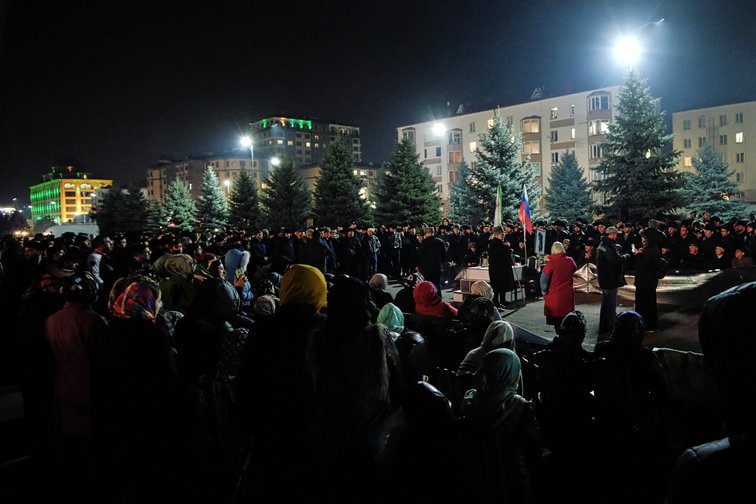
Angered at the transfer of 10% of a border region, a popular movement emerged in Ingushetia to protest this decision. Zarifa Sautiyeva, ex-deputy director of the Museum of Victims of Political Repression in Ingushetia, found herself in the middle of it alongside journalist Izabella Evloyeva - streaming the events live on Facebook.
Zarifa was later arrested as part of a crackdown on the movement, with 26 people charged with violence against the police. She is the only woman arrested for her part in the disruption caused by the issue and has been in a pre-trial detention centre since June 2019.
Zarifa’s friend, journalist Isabella Yevloyeva, who also took part in the protests and has had to leave the country, tells her story up to her arrest and recollects the events that have changed the lives of both women.
4 October 2018. “Scum! Scum! We won’t leave!” I hear my own voice. “Scummmm!” Zarifa shouts after me as a series of rifle rounds are fired into the air. Someone in the crowd had thrown a bottle at Yunus-Bek Yevkurov, head of Ingushetia, after a scuffle broke out and his guards fired in the air.
There are tens of thousands of protesters on the main square in Magas, the capital of Ingushetia in Russia’s North Caucasus. Zarifa Sautieva and I are standing at a bus shelter a hundred metres away from the shooting: it’s the only place around with Wi-Fi – the authorities have shut down mobile internet everywhere else. We’re streaming the incident on Facebook, to record what’s going on in our home republic after Evkurov signed an agreement to hand 10% of a border region over to neighbouring Chechnya.
Eighteen months later, the whole world is in forced isolation because of the Coronavirus epidemic, but Zarifa has been isolated for much longer. She is in a pre-trial detention centre in the city of Nalchik, alongside other activists. Fate has unexpectedly thrown us apart: many are behind bars; some are still at liberty and a few have left the country and can’t return home.
I’m one of the latter. I left Ingushetia as part of a journalist relocation programme, a month and a half before the last protest rally, which accidentally saved me from jail and allowed me to continue my struggle - in journalism. Zarifa and I were schoolmates and, as it later turned out, even shared an office. Our school had two shifts for pupils – hers in the morning, mine in the afternoon. But we got to know one another decades later, on Facebook. She gave me the impression of a strong-minded, forceful woman – as indeed she is.

“She had an acute sense of justice right from childhood,” says Rumina, Zarifa’s elder sister. “She had a very inquiring mind, was an early reader and could recite whole swathes of Eugene Onegin by heart at five, when she also began school. Her father loved her dearly – he was nearly 50 when she was born. Children in Ingushetia don’t usually sit at the same table with their father, out of respect, and she was the first in our family to do so.”
Zarifa grew up in a large family, with two brothers and five sisters. She was the youngest child but an excellent learner, entering the regional university’s history faculty and earning a first class degree.
“She has an amazing memory, and I don’t remember her ever doing homework. She found learning easy,” Rumina recollects. “She’s also very tender hearted, always wanting to help people, be supportive. She always helped her friends and printed essays and abstracts for them – we would have a whole team of friends hanging around at home, with her helping them.”
In Zarifa’s third year at university, she was offered work as a history teacher at a school. She decided to combine it with her own university course, and afterwards she became a tour guide at Ingushetia’s Museum to Victims of Political Repression. The museum was opened in 1997, on the anniversary of the deportation of the Ingush nation in 1944, when thousands of people were forcibly resettled by Soviet forces in Central Asia. It contains evidence and testimony of the historic pain of our people, but has since been turned into a memorial to “memory and glory”, with displays devoted to Ingush heroes.
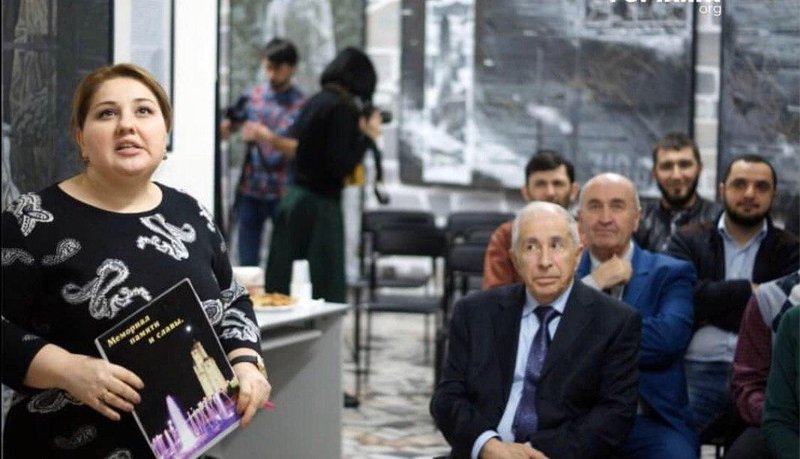
Zarifa grew up in a large family, with two brothers and five sisters. She was the youngest child but an excellent learner, entering the regional university’s history faculty and earning a first class degree.
“She has an amazing memory, and I don’t remember her ever doing homework. She found learning easy,” Rumina recollects. “She’s also very tender hearted, always wanting to help people, be supportive. She always helped her friends and printed essays and abstracts for them – we would have a whole team of friends hanging around at home, with her helping them.”
In Zarifa’s third year at university, she was offered work as a history teacher at a school. She decided to combine it with her own university course, and afterwards she became a tour guide at Ingushetia’s Museum to Victims of Political Repression. The museum was opened in 1997, on the anniversary of the deportation of the Ingush nation in 1944, when thousands of people were forcibly resettled by Soviet forces in Central Asia. It contains evidence and testimony of the historic pain of our people, but has since been turned into a memorial to “memory and glory”, with displays devoted to Ingush heroes.

Zarifa had always been interested in the issue of deportation and Stalin’s repressions. Her father survived deportation as a child and buried his mother in the Kazakh steppe. She travelled there with a colleague to study archives, photograph burial sites and collect material for the museum – all this, of course, also in memory of her lost family.
Zarifa was quickly promoted to deputy director of the museum, and launched a project (“I am a witness”), dedicated to the victims of Stalin’s deportations. “Zarifa realised that as the older generation dies, their memories die with them, so she decided to record memories of the deportation on video, to preserve them,” Rumina says. “She put out a call on Facebook to collect money for equipment. She didn’t manage to raise the whole amount, but Moscow colleagues gave her the necessary video technology.”
Under Zarifa’s influence, the museum became a meeting place for the active element of Ingush civil society. She organised thematic quizzes, as well as musical and theatrical shows and evenings dedicated to important historic dates.
Zarifa was quickly promoted to deputy director of the museum, and launched a project (“I am a witness”), dedicated to the victims of Stalin’s deportations. “Zarifa realised that as the older generation dies, their memories die with them, so she decided to record memories of the deportation on video, to preserve them,” Rumina says. “She put out a call on Facebook to collect money for equipment. She didn’t manage to raise the whole amount, but Moscow colleagues gave her the necessary video technology.”
Under Zarifa’s influence, the museum became a meeting place for the active element of Ingush civil society. She organised thematic quizzes, as well as musical and theatrical shows and evenings dedicated to important historic dates.
In addition to all this, Sautiyeva supported blind and partially sighted children. “Watching her with these youngsters, I was pleasantly surprised at how easily and naturally she behaved with them,” says Adam Sagov, head of the Ingushetia branch of the all-Russian Association of the Blind.
Zarifa’s last posting on Facebook was connected with the association: its computer had broken down and she asked her friends to help fix it. Thanks to their efforts, a new computer was found, but on the very next day, Zarifa was arrested.
Zarifa’s last posting on Facebook was connected with the association: its computer had broken down and she asked her friends to help fix it. Thanks to their efforts, a new computer was found, but on the very next day, Zarifa was arrested.
Protests in Magas, 4 October 2018.
The protests in Ingushetia began in October 2018, and Zarifa took part in them from the start. Women don’t traditionally take part in protests in Ingushetia: it’s not seen as a proper role for them - that’s a men’s thing. But this protest was different. On the morning of its first day, 4 October, I saw women in the crowd, although only a few. This gave me hope for a positive outcome for the protest – the issue, after all concerned everyone. I certainly knew that Zarifa would be there, as we had spent the previous few days together and knew what was happening.
Women came with other women, some with family members and some alone. I was with my husband, also an activist, and Zarifa usually came with her brother or adult nephew. We felt completely safe during the protest. There was a crowd of men around us, but we knew that not only would none of them offend us, but, on the contrary, they would give their lives to save someone else’s. The police didn’t bother us either. They were on the protesters’ side.
On 14 November, a month after the start of the protest meetings, an order arrived from Ingushetia’s Ministry of Culture about job cuts at Zarifa’s museum. The order came into force in January 2019, and Sautiyeva was fired from her job as deputy director. Realising that her dismissal was connected with her taking part in protests, she challenged the legality of the ministry’s action. In March, her dismissal was deemed illegal and she reinstated her in her previous job.
But that wasn’t the end of the story: the museum acquired a new director, who, according to its staff, was deliberately appointed in order to get rid of Zarifa. In late May 2019, six weeks before her arrest, the staff were informed about Zarifa’s dismissal. And her project on Stalin’s deportations came to an end.
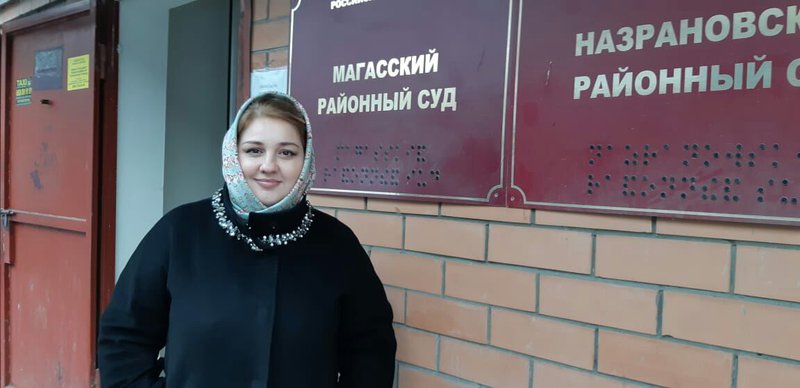
The protests in Ingushetia began in October 2018, and Zarifa took part in them from the start. Women don’t traditionally take part in protests in Ingushetia: it’s not seen as a proper role for them - that’s a men’s thing. But this protest was different. On the morning of its first day, 4 October, I saw women in the crowd, although only a few. This gave me hope for a positive outcome for the protest – the issue, after all concerned everyone. I certainly knew that Zarifa would be there, as we had spent the previous few days together and knew what was happening.
Women came with other women, some with family members and some alone. I was with my husband, also an activist, and Zarifa usually came with her brother or adult nephew. We felt completely safe during the protest. There was a crowd of men around us, but we knew that not only would none of them offend us, but, on the contrary, they would give their lives to save someone else’s. The police didn’t bother us either. They were on the protesters’ side.
On 14 November, a month after the start of the protest meetings, an order arrived from Ingushetia’s Ministry of Culture about job cuts at Zarifa’s museum. The order came into force in January 2019, and Sautiyeva was fired from her job as deputy director. Realising that her dismissal was connected with her taking part in protests, she challenged the legality of the ministry’s action. In March, her dismissal was deemed illegal and she reinstated her in her previous job.

Sautiyeva was first arrested on 3 April 2019 – a week after the last protest rally. That morning, law enforcement conducted a series of apartment searches and arrests throughout the republic, followed by a court hearing where four people who had taken part in protests received fines for breaking the rules on protest rallies. Zarifa and several other activists were released.
“Zarifa was very calm during apartment searches,” Rumina recalls. “They had to react somehow. So, are we now going to stay at home and stop defending our rights? Is that it?”
During the protests in late March 2019, she, as usual, broadcast the entire affair on Facebook - unaware that investigators would later charge her with participating in this event. The protest was officially supposed to last one day, but the authorities came to a verbal agreement with protest leaders, to extend it for a second day, and the people on the square waited, expecting a written agreement of some kind. Zarifa came home in the evening, but when she discovered that security forces were planning to disperse the protesters, she went back with her brother to film what was going on.
When protesters were being actively arrested, Zarifa’s brother Hezir also found himself among those arrested. I remember how Zarifa worried about it – she saw it as her fault and was literally eating herself up over it. But law enforcement couldn’t find proof of Hezir’s participation in the clashes with the police, and he was released that same evening.
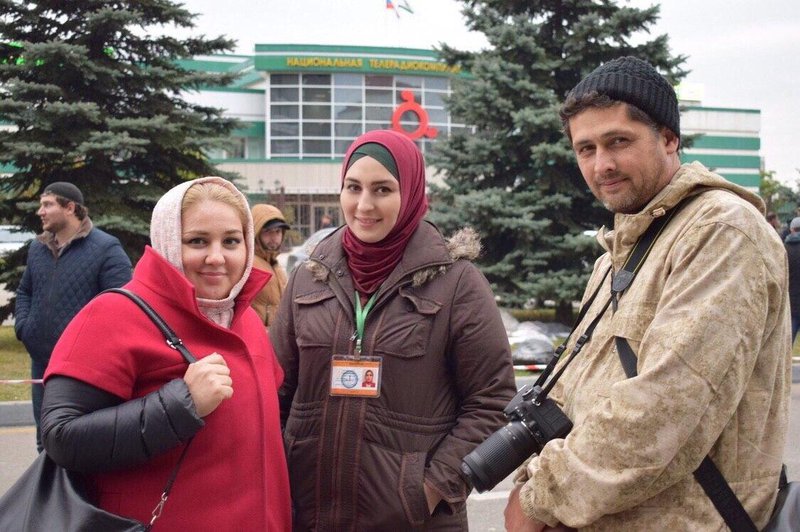
“Zarifa was very calm during apartment searches,” Rumina recalls. “They had to react somehow. So, are we now going to stay at home and stop defending our rights? Is that it?”
During the protests in late March 2019, she, as usual, broadcast the entire affair on Facebook - unaware that investigators would later charge her with participating in this event. The protest was officially supposed to last one day, but the authorities came to a verbal agreement with protest leaders, to extend it for a second day, and the people on the square waited, expecting a written agreement of some kind. Zarifa came home in the evening, but when she discovered that security forces were planning to disperse the protesters, she went back with her brother to film what was going on.
When protesters were being actively arrested, Zarifa’s brother Hezir also found himself among those arrested. I remember how Zarifa worried about it – she saw it as her fault and was literally eating herself up over it. But law enforcement couldn’t find proof of Hezir’s participation in the clashes with the police, and he was released that same evening.

Zarifa was arrested on 12 June 2019, two weeks after the resignation of Yunus-Bek Yevkurov. At that point, everyone thought that the repressions against civil activists had come straight from Evkurov, the head of the republic, and that his resignation would lead to a thaw. Before Zafira was arrested, she had been staying in Moscow - her family insisted that she leave Ingushetia and she successfully avoided a wave of arrests there. She told me that she was on her way home to Ingushetia, because she was tired of staying with friends and wanted to be near her nephews, whom she loved dearly. I didn’t want her to go, but at the same time understood her state of mind. I was in Europe, I couldn’t return home because I might be arrested, but I really missed my children.
I knew that Zarifa was back home when she sent me a text message. Her decisiveness is her most distinctive trait: if she takes a decision, she goes through with it. But her decision to return to Ingushetia was, in my view, a fatal mistake.
“When I read the news about Zarifa’s arrest, I had the same feeling as I had when my mother and father died, when you go hot and cold simultaneously from head to foot,” Rumina says. Discussions between Zafira’s lawyer Bilan Dzugayev and the police led to nothing – Sautiyeva was taken to pre-trial detention in neighbouring Kabardino-Balkaria, where other activists were already detained.
“She behaved very bravely: refused to give any evidence and demanded a lawyer,” says Bilan Dzugayev, her lawyer. “I know from experience that men are often broken by an unexpected arrest and tend to ‘drift’ – become confused and contradict themselves. Of course, she was frightened and shocked, and couldn’t believe that she, an innocent person, was being arrested.”
Zarifa was accused of using violence against police officers and organising this violence. Later on, she was also charged with membership of an extremist organisation.
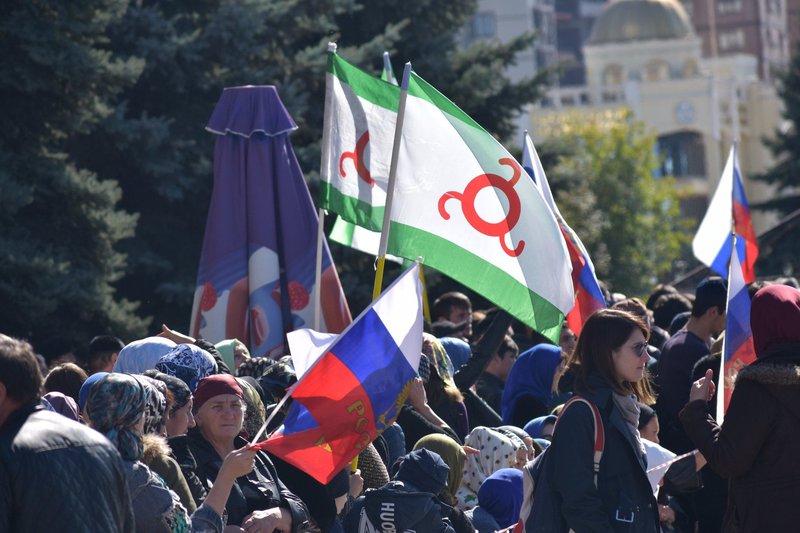
I knew that Zarifa was back home when she sent me a text message. Her decisiveness is her most distinctive trait: if she takes a decision, she goes through with it. But her decision to return to Ingushetia was, in my view, a fatal mistake.
“When I read the news about Zarifa’s arrest, I had the same feeling as I had when my mother and father died, when you go hot and cold simultaneously from head to foot,” Rumina says. Discussions between Zafira’s lawyer Bilan Dzugayev and the police led to nothing – Sautiyeva was taken to pre-trial detention in neighbouring Kabardino-Balkaria, where other activists were already detained.
“She behaved very bravely: refused to give any evidence and demanded a lawyer,” says Bilan Dzugayev, her lawyer. “I know from experience that men are often broken by an unexpected arrest and tend to ‘drift’ – become confused and contradict themselves. Of course, she was frightened and shocked, and couldn’t believe that she, an innocent person, was being arrested.”
Zarifa was accused of using violence against police officers and organising this violence. Later on, she was also charged with membership of an extremist organisation.

“In the ruling on determining her accused status, everything was used against her, even the fact that she was a woman,” says Dzugayev. “Language used during her case included: The very fact of a woman being found at a protest meeting forced the male population to provide for their safety in any way possible, in an appeal to their sense of national dignity… This is pure fiction.”
According to Dzugayev, the investigation is not being conducted according to the law, and there is no chance of an objective investigation taking place.
“In December 2019, for example, the investigator effectively just copied all the previous legal papers, instead of starting from scratch to justify the extension of Sautiyeva’s detention, as he was obliged to do by law,” says Dzugayev. “Zarifa sees that the judges are behaving in a purely formal fashion, without looking at the facts of the case, as they examine the investigators’ petitions on extending the detention, and this has a depressing effect on her. But she is an optimist and hopes that one day this nightmare may end.”
Two weeks after her arrest, Zarifa’s brother who lived in Kazakhstan died – his heart gave out. According to Rumina, he was very affected by his favourite sister’s arrest.
“Zarifa only heard about this two months later. She criticised us for not telling her immediately. But we were trying to spare her, keeping silent because she was alone, with no one to support her or give her a friendly word. She was very close to her brother, and at her appeal, when she found out about the situation, we – all the sisters – grieved for him right in the courtroom.”
“In November 2019, Zarifa was transferred to a temporary isolation facility in the town of Yessentuka, supposedly for investigative operations that in fact never happened”, says Dzugayev.
“Zarifa wasn’t allowed to bring her things with her, nor could she bring medication [she is diabetic], hygienic supplies or changes of clothes for two weeks, as is her right. The isolation facility is also not designed for any extended detention. All this is hard for her to bear, but it hasn’t broken her.”
Despite numerous flashmobs, as well as petitions from public figures, politicians, MPs and senior civil servants, Zarifa has not been granted house arrest. The lawyers believe that her case, and those of other activists, are purely political. The Memorial Human Rights Centre has recognised Sautiyeva and the other activists as political prisoners, and the Boris Nemtsov Foundation nominated her for an annual award for valour in the battle for democratic values and human rights.
According to Dzugayev, the investigation is not being conducted according to the law, and there is no chance of an objective investigation taking place.
“In December 2019, for example, the investigator effectively just copied all the previous legal papers, instead of starting from scratch to justify the extension of Sautiyeva’s detention, as he was obliged to do by law,” says Dzugayev. “Zarifa sees that the judges are behaving in a purely formal fashion, without looking at the facts of the case, as they examine the investigators’ petitions on extending the detention, and this has a depressing effect on her. But she is an optimist and hopes that one day this nightmare may end.”
Two weeks after her arrest, Zarifa’s brother who lived in Kazakhstan died – his heart gave out. According to Rumina, he was very affected by his favourite sister’s arrest.
“Zarifa only heard about this two months later. She criticised us for not telling her immediately. But we were trying to spare her, keeping silent because she was alone, with no one to support her or give her a friendly word. She was very close to her brother, and at her appeal, when she found out about the situation, we – all the sisters – grieved for him right in the courtroom.”
The battle in the detention centre
In investigation detention, Zarifa regularly comes up against breaches of her rights and she reacts to this directly, writing complaints about her inhuman treatment.“In November 2019, Zarifa was transferred to a temporary isolation facility in the town of Yessentuka, supposedly for investigative operations that in fact never happened”, says Dzugayev.
“Zarifa wasn’t allowed to bring her things with her, nor could she bring medication [she is diabetic], hygienic supplies or changes of clothes for two weeks, as is her right. The isolation facility is also not designed for any extended detention. All this is hard for her to bear, but it hasn’t broken her.”
Despite numerous flashmobs, as well as petitions from public figures, politicians, MPs and senior civil servants, Zarifa has not been granted house arrest. The lawyers believe that her case, and those of other activists, are purely political. The Memorial Human Rights Centre has recognised Sautiyeva and the other activists as political prisoners, and the Boris Nemtsov Foundation nominated her for an annual award for valour in the battle for democratic values and human rights.
After Zarifa was arrested, she hoped - as did I - that the people in power in Ingushetia would do everything they could to release her
“I don’t think it was the border issue,” says Adam Sagov, from the All-Russian Association of the Blind. “This is a different matter. She is a historian by profession and a museum worker – who better than her to understand what happens when an unlimited and uncontrolled political system is concentrated in one pair of hands. This leads to all sorts of tragedies, including the deportation of an entire people. And the decision to hand over part of the territory of Ingushetia – secretly, behind closed doors, ignoring the opinions of anyone who objects – is a sign that power has been concentrated in the hands of a small group of people.”
During the entire time that Zarifa and other activists have been in detention, not one of them has had a single meeting with a family member. Zarifa’s family spend up to 12 hours on the road and come to every detention hearing in the hope of seeing her. Alas, this doesn’t always happen.
“The biggest problem is that they don’t bring her in – we hoped that we could at least see her there. When they bring her in to the room, there’s no hugging, kissing or otherwise touching. Couldn’t they at least allow her to weep for her dead brother, or speak about his last days - she keeps asking about him?” Rumina says.
According to Zarifa’s family and her lawyer, Zarifa still hopes that she will be released. But hope is a very irrational thing.
After Zarifa was arrested, she hoped - as did I - that the people in power in Ingushetia would do everything they could to release her. They are, after all, fellow-countrymen with the same concepts and upbringing as Zafira. Everyone in Ingushetia knows that she wasn’t behind the attack on the National Guard and is not a member of any extreme organisations. She still hasn’t been freed, but she hasn’t lost her hope. Everyone is, of course, distressed by Zarifa’s imprisonment: the very fact of her arrest is an affront to many men and the republic’s customs won’t accept this attitude to women.
“I hope that common sense will prevail and that people who have never called for any violence or caused any violence will still, sooner or later be released”, says Bilan Dzugayev. “As a lawyer, I realise that Zarifa was charged under very stringent laws: up to 10 years on one count and six on another. But I have no doubt that the investigation won’t provide proof of Sautiyeva’s guilt, and that something more positive will turn up when we get to court.”.
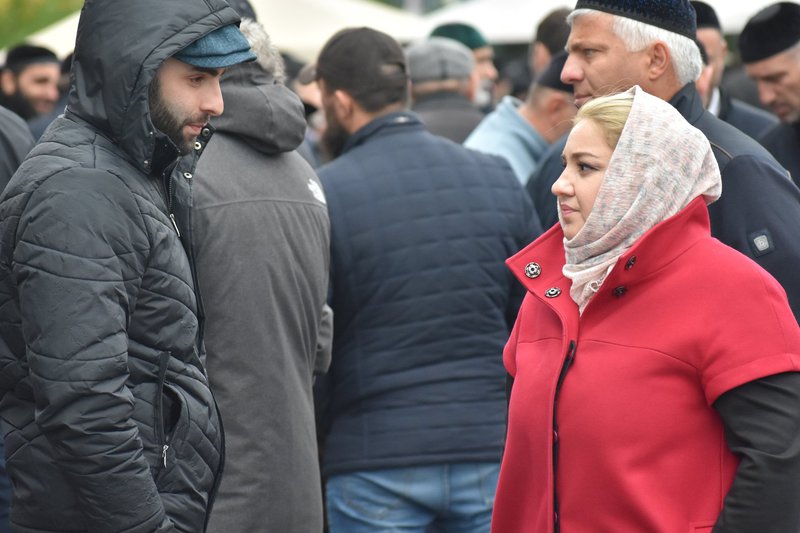 Zarifa Sautiyeva during the protests | Source: Yakub Gogiyev
Zarifa Sautiyeva during the protests | Source: Yakub Gogiyev
During the entire time that Zarifa and other activists have been in detention, not one of them has had a single meeting with a family member. Zarifa’s family spend up to 12 hours on the road and come to every detention hearing in the hope of seeing her. Alas, this doesn’t always happen.
“The biggest problem is that they don’t bring her in – we hoped that we could at least see her there. When they bring her in to the room, there’s no hugging, kissing or otherwise touching. Couldn’t they at least allow her to weep for her dead brother, or speak about his last days - she keeps asking about him?” Rumina says.
According to Zarifa’s family and her lawyer, Zarifa still hopes that she will be released. But hope is a very irrational thing.
After Zarifa was arrested, she hoped - as did I - that the people in power in Ingushetia would do everything they could to release her. They are, after all, fellow-countrymen with the same concepts and upbringing as Zafira. Everyone in Ingushetia knows that she wasn’t behind the attack on the National Guard and is not a member of any extreme organisations. She still hasn’t been freed, but she hasn’t lost her hope. Everyone is, of course, distressed by Zarifa’s imprisonment: the very fact of her arrest is an affront to many men and the republic’s customs won’t accept this attitude to women.
“I hope that common sense will prevail and that people who have never called for any violence or caused any violence will still, sooner or later be released”, says Bilan Dzugayev. “As a lawyer, I realise that Zarifa was charged under very stringent laws: up to 10 years on one count and six on another. But I have no doubt that the investigation won’t provide proof of Sautiyeva’s guilt, and that something more positive will turn up when we get to court.”.
 Zarifa Sautiyeva during the protests | Source: Yakub Gogiyev
Zarifa Sautiyeva during the protests | Source: Yakub Gogiyev
No comments:
Post a Comment
Note: only a member of this blog may post a comment.